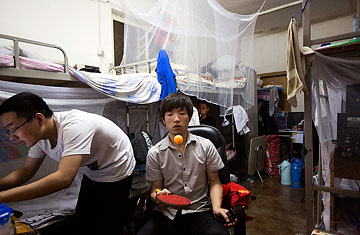
A bug's life Members of Beijing's low-paid or unemployed "ant tribe" kill time in their shared tenement
(2 of 3)
Unlike their parents, who grew up in what was essentially a classless society, China's youth have matured in a country of hardening social stratification. Yes, it is still a place of remarkable opportunity. The average age of Chinese millionaires is 39, at least 15 years younger than in the U.S., according to Shanghai-based wealth monitor Hurun Report. China will be the world's largest luxury market by 2015, and around 45% of its luxury consumers are under the age of 35, according to research by consultancy McKinsey & Co. The tastes and ambitions of China's young moneyed classes will dictate not only the direction of the local economy but also the way the world hones its sales pitches for this vital consumer market.
But with the economy slowing sharply, the trappings of the urban Chinese dream — the TV, the car, the overseas vacations and, most of all, an apartment to call one's own — are increasingly out of reach for many young people, particularly those born after 1990 and coming of age in this uncertain economic era. How will a young generation weaned on double-digit growth rates cope with the disconnect between their exuberant expectations and the new economic reality? In May, the average 90-sq-m apartment in Beijing cost 1.8 million yuan (about $283,000), more than 30 times the capital's average annual income, while unemployment among recent university graduates has hovered as high as 25% over the past couple of years. "The collective memory of young Chinese people until a couple years ago was of a trajectory that always went up," says Kevin Lee, COO of China Youthology, a Beijing-based market-research firm. "Now young people are dealing with unemployment and rising costs and realizing that tomorrow might not be better than today."
China's latest generation of little emperors and empresses, as these only children are called, aren't shy about expressing their dissatisfaction with the way things stand. "Young people in China today believe that their opinions matter," says author Bergstrom. "This is a population that is more informed and vocal and committed to actively organizing." Digital communications are crucial in bringing them together and giving them a platform to express themselves. In 2010, young Chinese in the workforce spent an average of nearly 34 hours a week communicating electronically, whether through social networking, texting, instant messaging or even old-fashioned e-mail, according to a study by consultancy Accenture.
And that was back when China only had 40 million Weibo accounts, the Twitter-like microblogs that can subvert the government-controlled traditional media. (Twitter, Facebook and YouTube are blocked in China.) Today there are 300 million Weibo microblogs, and through them the youth are articulating everything from their tastes in luxury brands to their outrage over urban pollution and consumer-safety scandals. One of the most powerful emotions expressed online is resentment at the showy ways of princelings — the fuerdai (children of rich businessmen) and guanerdai (offspring of government officials) — with their sense of entitlement and access to guanxi, the web of relationships that is interwoven into Chinese business. The son of disgraced party boss Bo Xilai, Bo Guagua, who in May graduated from Harvard, where he tooled around in a Porsche, is just the latest representative of a gilded class to spark online furor.
The flowering of online expression disproves the oft repeated trope that China's youth are divorced from politics. True, they may not think it crucial to know the exact composition of the Politburo that helms the country. But they "consider themselves citizens, which their parents never did," says Zafka Zhang, a co-founder of China Youthology. "Rich or poor, they are concerned about the same social issues, like corruption or food safety, and if they don't see solutions being reached, they will organize and try to change things." Could a generational protest movement be the very thing that so scares a Communist Party that has ruled for 63 years? "Sure, everyone thinks so," says the fashionable 33-year-old, who attended graduate school in Britain before returning home to immerse himself in local youth culture. "But who knows when that will happen?" It has happened once before, and not too long ago: the 1989 Tiananmen protests gathered force, in part, as a student-led outcry against corruption, nepotism and the wild ways of young Communist Party elite.
